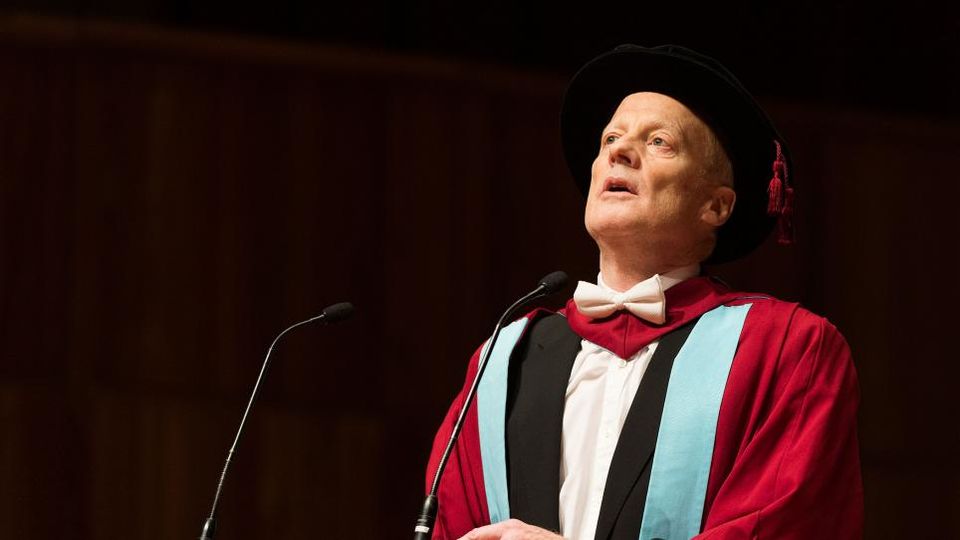Professor Simon Shepherd

The title we confer on Simon today will enable this scholarship to remain affiliated with Central.
Professor Ross Brown
Vice Chancellor, graduands, Honourands, Principal, ladies and gentlemen.
The Royal Central School of Speech and Drama you see making a performance of itself on this stage and in this auditorium is very different to the one Simon Shepherd joined as Director of Programmes in 2001. Back then there were no PhDs awarded. There were very few Masters Degrees. No Honorary Fellowships were bestowed. The Faculty did not dress up in their gowns and sub-fusc. There was no mace-bearer. There was no mace. There was no Vice-Chancellor. There was no Elsie’s Chair. It is by such symbols perhaps that culture change may be gauged.
Shepherd came to Central from a background in University Drama. An established scholar of theatre’s cultural history, concepts and practices, he was widely published on the politics of English theatre in the sixteenth and seventeenth centuries, as well as on the performing body and on melodrama. He had written polemically on the ‘life and crimes’ of Joe Orton and Kenneth Halliwell and produced a standard textbook, Studying Plays, co-written with his partner Mick Wallis, now in its third edition.
There were many in the drama school establishment who were surprised if not alarmed by the appointment of a university academic. Equally, many in the university drama sector were surprised that Shepherd moved to Central, a place with next to no research profile, famous for training theatre professionals and educators.
But that was thirteen years ago. Central’s profile within the broader institution of higher education drama is now transformed. Central is now not only a big fish in the small pond of elite drama schools, but also swims confidently in the same waters as the country’s leading universities. This is Shepherd’s impact and his legacy. As a leader he has mentored and encouraged staff to be less parochial, to engage as subject experts in wider networks, and above all to be productive; to make outputs. However, alongside this leadership Simon has been a persistent agitator. He has agitated the cosy antipathy that can exist between the conservatoire and the university sectors. This antipathy has, in my view, divided and weakened the study of drama in the UK for half a century. He has agitated practitioners who object to academic interest in their practice, and academics who will not take practical craft seriously. He has agitated anti-intellectuals and intellectual snobs.
The Royal Central from which he now retires has become more than the sum of its industrial and academic parts. It has become a distinctive, perhaps even world-leading ‘university-conservatoire’. But what does this phrase mean?
It means Central is a kind of hybrid, or sublation, of the concepts of university and conservatoire. As a university college it is invigorated by its students’ expectations of gold-standard training. As a drama school it is challenged, extended and profoundly enriched by academic discourse. Rather than seeing a contradiction between conservatoire and university, between professional training and research culture, Shepherd saw a productive tension; a source of energy.
Shepherd’s job was to be in charge of all learning, teaching, researching, outreaching, technical supporting, academic administrating, library servicing and quality assuring, but he was never going to simply be an academic manager. His first major move in 2002 was to restructure three departments, of Performance, Education and Production Art and Design, into one Faculty with two Schools, the well-established School of Undergraduate Studies, and a small Postgraduate School charged with growing. This it did. Within five years, Central had become a world-leader in specialist masters’ degrees in different drama and performance practices.
In 2004 the school applied for and gained Taught Degree Awarding Powers – a first for any drama school in England. However, it has never used these powers, because in 2005, Shepherd led the school’s successful bid to become a federal college of the University of London. Central thus became eligible to award the brown University of London hoods that are conferred on graduands here today. The university’s acceptance recognised a credible and developing research culture. Membership allowed Central to offer doctorates, and through peer review, to confer academic titles upon its staff. In due course Shepherd became Central’s first University of London Professor.
Now as Deputy Principal Academic, Shepherd led Central to success in the 2008 research assessment exercise. We now await the results of the 2013 Research Audit, to which Shepherd also contributed as an individual researcher. Throughout his time at Central he has continued to publish prolifically. Highlights include the 2013 volume on Direction in a Palgrave book series that he also edits, The Cambridge Introduction to Modern British Theatre in 2010; Theatre, Body and Pleasure for Routledge in 2006 and, Drama/ Theatre/ Performance: a New Critical Idiom, again with Mick Wallis, for Routledge, in 2004.
Notwithstanding the pressures of maintaining his and Mick’s vegetable allotment and wine cellar, there will, I know, be more publications to come. The title we confer on Simon today will enable this scholarship to remain affiliated with Central.
Vice-Chancellor, it is with great personal pleasure and gratitude that I am authorised by Central’s Conferment of Academic Titles Committee to confirm the title of Professor Emeritus in Theatre to be awarded to Professor Simon Shepherd, on the occasion of his retirement from the University of London’s Royal Central School of Speech and Drama.
- Professor Ross Brown
